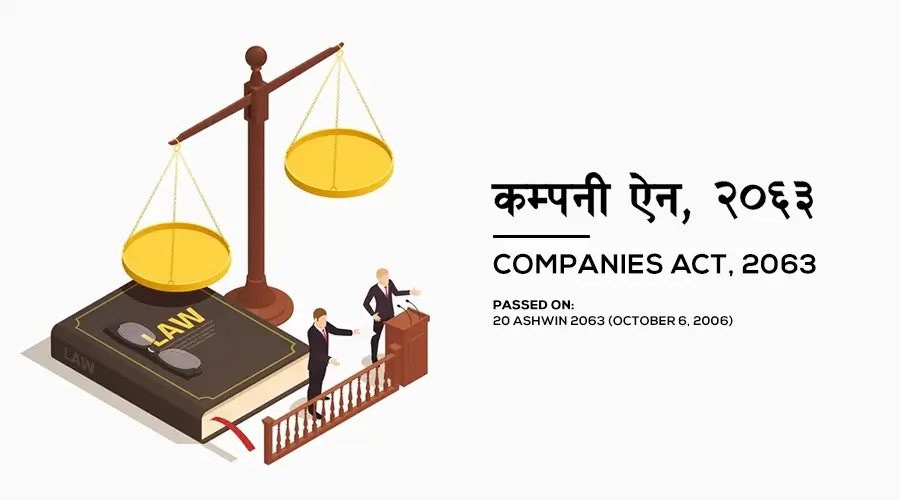
Introduction
The Companies Act 2063 (2006 A.D.) is the main law for running companies in Nepal. It explains how to start, manage, and operate a business legally. This law helps entrepreneurs, investors, and organizations run businesses in a fair and transparent way.
Before this law, Nepal followed the Companies Act 1997 (2053 B.S.), which was replaced to match modern business practices and global standards. The 2063 Act makes it easier to register a company, protects shareholders’ rights, and promotes fair competition.
Whether you are starting a private company, public company, or non-profit organization, understanding this law is important. It guides you through company registration, management, compliance, and even closing a business.
This guide provides a clear overview, explaining the goals, main features, and importance of the Companies Act 2063 for anyone doing business in Nepal.
Background of the Companies Act 2063
Before 2006, Nepal followed the Companies Act 1997, which governed company formation and operations. As business grew and global standards evolved, the old law became outdated.
The Act was passed on 20 Ashwin 2063 in the Nepali calendar, which corresponds to October 6, 2006, in the English calendar.
The Companies Act 2063 was introduced to:
- Encourage entrepreneurship and investment.
- Make company registration and management easier.
- Increase transparency and accountability.
- Protect the rights of shareholders and stakeholders.
It also set clear rules for Private, Public, and Non-Profit companies, ensuring they operate legally. The Act helped modernize Nepal’s business environment and make it more investor-friendly.
Objectives of the Companies Act 2063
The main goals of the Act are to create a transparent, fair, and growth-oriented business environment in Nepal. Key objectives include:
| Objective | Description |
|---|---|
| Encourage Entrepreneurship and Investment | Help individuals and organizations start, operate, and grow businesses in Nepal. |
| Simplify Company Registration and Operation | Make the process of forming and managing companies easier, faster, and more efficient. |
| Ensure Transparency and Accountability | Require companies to maintain proper financial records, submit annual reports, and follow governance standards. |
| Protect Shareholders’ and Stakeholders’ Rights | Ensure fair treatment, access to company information, and equitable profit distribution among investors. |
| Encourage Fair Competition and Good Governance | Promote ethical business practices and prevent fraud, misuse of power, and corruption. |
| Align with International Corporate Standards | Modernize Nepal’s company law system to attract foreign investment and global partnerships. |
Key Features of the Companies Act 2063
The Act provides rules for the formation, management, and regulation of companies. Its main features include:
- Company Registration:
- Defines how to register a company with the Office of the Company Registrar (OCR).
- Gives a company a legal identity separate from its owners.
- Types of Companies:
- Private Limited Company: Small number of shareholders; shares not traded publicly.
- Public Limited Company: Can sell shares to the public; follows stricter rules.
- Non-Profit Company: For social, charitable, or community purposes; profits are reinvested.
- Company Structure and Management:
- Defines roles of Directors, Board of Directors, and executives.
- Explains decision-making and meeting procedures.
- Share Capital and Shareholders:
- Rules for issuing shares, keeping registers, and distributing dividends.
- Protects shareholders’ rights.
- Auditing and Financial Reporting:
- Companies must maintain proper accounts and submit annual reports.
- Mergers, Amalgamations, and Liquidation:
- Provides a legal process for merging or closing companies.
- Penalties and Compliance:
- Specifies fines and consequences for violations.
Rights and Responsibilities of Directors and Shareholders
Directors:
- Make strategic decisions and act in the company’s best interest.
- Ensure compliance with the law.
- Approve budgets and review financial statements.
- Represent the company in contracts and legal matters.
Shareholders:
- Vote in company decisions during meetings.
- Receive dividends according to shareholding.
- Access financial statements and reports.
- Provide accurate information during registration.
Clear rights and responsibilities help prevent disputes and promote good governance.
Penalties and Legal Provisions
| Category | Description |
|---|---|
| Penalties for Non-Compliance | Fines for missing reports, audits, or registrations. |
| Fraud or Misreporting | Providing false information or embezzling funds can lead to legal action. |
| Protection of Minority Shareholders | Prevents exploitation by majority owners and provides legal remedies. |
| Enforcement | The Office of the Company Registrar (OCR) monitors compliance, and courts handle disputes or violations. |
Recent Amendments & Updates
The Act has been updated to match changes in business and investment practices. Key updates include:
- Non-resident Nepali citizens (NRNs) can now be more active as company promoters.
- Registration cancellation for non-operational companies has been simplified.
- Improved transparency and governance rules for public companies.
Keeping up with these changes is important for all business owners and investors.
Download Companies Act 2063 (2006 A.D.)
You can download the PDF copy of the Act in Nepali and English:
| Language | Download Link |
|---|---|
| Nepali | Download PDF |
| English | Download PDF |